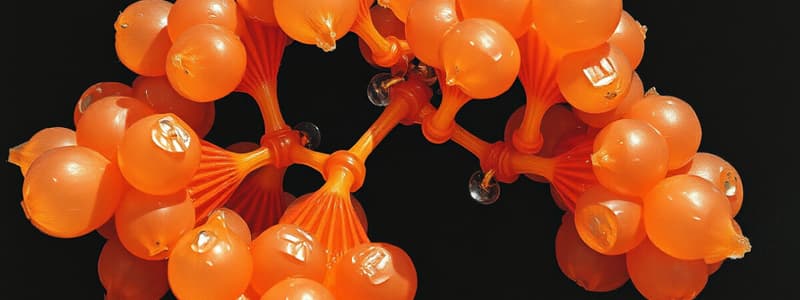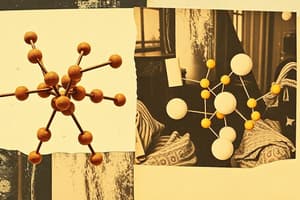Podcast
Questions and Answers
What condition is associated with heart diseases, strokes, and high blood pressure?
What condition is associated with heart diseases, strokes, and high blood pressure?
- Atherosclerosis (correct)
- Hypertension
- Diabetes
- Heart failure
What hormone is primarily responsible for the development of male genital organs?
What hormone is primarily responsible for the development of male genital organs?
- Testosterone (correct)
- Lutenizing hormone
- Estrogen
- Progesterone
How is estrogen synthesized in the body?
How is estrogen synthesized in the body?
- From testosterone (correct)
- From progesterone
- From cholesterol
- From fatty acids
What is a characteristic of anabolic steroids?
What is a characteristic of anabolic steroids?
What type of molecule is a wax considered to be?
What type of molecule is a wax considered to be?
Which of the following is NOT a type of protein mentioned?
Which of the following is NOT a type of protein mentioned?
What are proteins composed of?
What are proteins composed of?
Which protein type is responsible for catalyzing biochemical reactions?
Which protein type is responsible for catalyzing biochemical reactions?
What is the primary structure of cell membranes in most organisms?
What is the primary structure of cell membranes in most organisms?
What characteristic defines saturated fats?
What characteristic defines saturated fats?
What property of the lipid bilayer makes it an effective barrier for cells?
What property of the lipid bilayer makes it an effective barrier for cells?
From which precursor are all steroids derived in animals?
From which precursor are all steroids derived in animals?
How do unsaturated fats differ structurally from saturated fats?
How do unsaturated fats differ structurally from saturated fats?
What forms the structure of a phospholipid?
What forms the structure of a phospholipid?
What structural feature is characteristic of steroids?
What structural feature is characteristic of steroids?
What is the arrangement of a phospholipid bilayer in cell membranes?
What is the arrangement of a phospholipid bilayer in cell membranes?
Which of the following is NOT a function associated with steroids?
Which of the following is NOT a function associated with steroids?
What is a known consequence of cholesterol in the bloodstream?
What is a known consequence of cholesterol in the bloodstream?
Which statement about triglycerides is true?
Which statement about triglycerides is true?
Which steroid is known to help in fat transport and excretion from the liver?
Which steroid is known to help in fat transport and excretion from the liver?
What is a significant advantage of the phospholipid bilayer structure?
What is a significant advantage of the phospholipid bilayer structure?
Which fatty acid structure can be described as 'saturated with hydrogen'?
Which fatty acid structure can be described as 'saturated with hydrogen'?
How do lipid bilayers affect the regulation of ion concentrations in cells?
How do lipid bilayers affect the regulation of ion concentrations in cells?
What is the primary function of cell membranes formed by phospholipids?
What is the primary function of cell membranes formed by phospholipids?
What is a characteristic feature of all amino acids?
What is a characteristic feature of all amino acids?
What is the primary structure of a protein?
What is the primary structure of a protein?
Which statement describes the secondary structure of proteins?
Which statement describes the secondary structure of proteins?
What is true about denaturation of proteins?
What is true about denaturation of proteins?
How does an enzyme function in a living system?
How does an enzyme function in a living system?
What defines the quaternary structure of a protein?
What defines the quaternary structure of a protein?
Enzymes are specific to their substrates. This means that:
Enzymes are specific to their substrates. This means that:
What role do R groups (side chains) play in amino acids?
What role do R groups (side chains) play in amino acids?
What type of bond links two monosaccharides to form disaccharides?
What type of bond links two monosaccharides to form disaccharides?
Which of the following is a disaccharide formed from glucose and fructose?
Which of the following is a disaccharide formed from glucose and fructose?
Which statement accurately describes glycogen?
Which statement accurately describes glycogen?
What distinguishes α and β glycosidic bonds?
What distinguishes α and β glycosidic bonds?
Which polysaccharide is the most abundant organic compound on Earth?
Which polysaccharide is the most abundant organic compound on Earth?
What characteristic makes polysaccharides ideal storage molecules for energy?
What characteristic makes polysaccharides ideal storage molecules for energy?
What is the primary location for glycogen storage in humans?
What is the primary location for glycogen storage in humans?
Which of the following best describes the structure of polysaccharides?
Which of the following best describes the structure of polysaccharides?
Flashcards are hidden until you start studying
Study Notes
Carbohydrates: Disaccharides
- Disaccharides consist of two monosaccharides joined by a glycosidic bond, a type of covalent bond linking sugar molecules.
- Sucrose, or table sugar, is formed from one glucose molecule and one fructose molecule through glycosidic linkage.
- Maltose, known as beer sugar, is comprised of two glucose molecules.
- Lactose, the milk sugar, consists of one galactose molecule and one glucose molecule.
- Glycosidic linkages can be classified as α (between two alpha sugars) and β (between two beta sugars).
Polysaccharides
- Polysaccharides are complex carbohydrates consisting of chains of monosaccharides linked by glycosidic bonds.
- Ideal for energy storage, polysaccharides are large, insoluble in water, and can fold into compact shapes for easy conversion to sugars when needed.
- Glycogen is a branched polysaccharide found in animal cells, primarily stored in the liver and muscles, serving as the main carbohydrate reservoir for glucose.
- Cellulose, the most abundant organic compound on Earth, allows for permeability of water and solutes, crucial for cellular function.
Lipids
- Lipids characterize several classes, including triglycerides, phospholipids, and steroids.
- Saturated fats are triglycerides with fatty acids containing the maximum number of hydrogens, making them solid at room temperature and closely packed.
- Unsaturated fats contain double bonds in fatty acids, resulting in kinks that prevent tight packing, leading to liquid forms like oils.
- Phospholipids form the foundation of cell membranes, creating a bilayer with hydrophobic lipid ends facing inward and hydrophilic phosphate ends outward.
Steroids
- Steroids have a unique structure, comprising a fused ring system of three cyclohexanes and one cyclopentane.
- Steroids, including cholesterol and sex hormones, have numerous carbon-hydrogen bonds, rendering them non-polar.
- Cholesterol, a key component in cell membranes, can lead to health issues such as atherosclerosis when deposited in the blood vessel walls.
Hormones
- Testosterone, the primary male hormone, is synthesized from cholesterol and drives the development of male reproductive organs and secondary sexual characteristics.
- Estrogen and progesterone, primary female hormones, regulate functions in the uterus and ovaries, impacting the menstrual cycle.
Proteins
- Proteins are polymers made of amino acids and are crucial for structural components in tissues.
- Amino acids consist of an alpha carbon, an amine group, a carboxyl group, a hydrogen atom, and a variable side chain (R group).
- Out of hundreds of amino acids, only 20 are typically used to construct proteins, linked through peptide bonds into polypeptides.
- Protein structure is classified into four levels:
- Primary structure (amino acid sequence),
- Secondary structure (hydrogen bond formations),
- Tertiary structure (3D arrangement, stabilized by disulfide bonds),
- Quaternary structure (arrangement of multiple polypeptide chains).
- Denaturation disrupts secondary and tertiary structures, uncoiling proteins without breaking the primary peptide bonds.
Enzymes
- Enzymes are proteins that act as catalysts, facilitating reactions and increasing their rates significantly.
- Each enzyme is highly specific, acting on particular substrates to produce specific products.
- Enzymes can catalyze reactions in both forward and reverse directions, showcasing their versatility in metabolic processes.
Studying That Suits You
Use AI to generate personalized quizzes and flashcards to suit your learning preferences.




